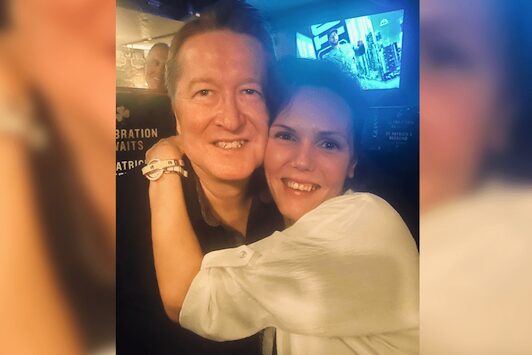It has been two months since Bojan, a 51-year-old man, attended the Minimally Invasive Cardiac Surgery (MICS) Clinic at St. Michael’s Hospital. After experiencing two major open-heart surgeries in the past, Bojan was offered an alternative pathway of care by Dr. Gianluigi Bisleri that uses a less invasive surgical approach to reduce trauma and return patients to their regular lives faster.
Bojan had previously undergone surgery to fix a hole in his heart – known as ventricular septal defect. Unfortunately, in 2017 he also had to undergo an emergency surgery due to a tear in his aorta, which required another invasive heart operation. To his surprise, last year he was found to have a leaky mitral valve, which would have required him to undergo a third cardiac surgery through the front of his chest. Another such surgery brought up significant concerns about the associated risks, and Bojan was obviously concerned about how well he could recover from a third open-heart
operation.
Bisleri, director of the Minimally Invasive Cardiac Surgery Program at St. Michael’s Hospital, was able to successfully repair the mitral valve by using a minimally invasive approach through a small (less than 2 inches) incision between the ribs. This approach avoided entering the chest from the front and cutting the breastbone again for the third time. The procedure was extremely successful, allowing Bojan to return home only four days after his surgery.
With conventional open-heart surgery, patients usually stay longer in hospital and require prolonged time to recover and return to their normal daily activities, Bisleri says. However, with the innovation of minimally invasive surgery, patients are going home in only a few days and most importantly, they can recuperate much faster and easier.
“It’s notable how fast Bojan was able to go home and return to his usual activities, as it was his third operation. Patients undergoing conventional surgery typically take weeks, sometimes months, to fully recover,” Bisleri said, adding that he is very pleased with the outcome.
“The surgery was extremely complex and challenging, but it really shows how far we have come with our minimally invasive cardiac surgery program at St. Michael’s Hospital.”
Bojan said that a few days after surgery he was completely mobile. “The recovery was not as bad as the past. Very different,” he said.
Bisleri says minimally invasive cardiac surgery is still a relatively new concept in Canada. Not many patients are aware of the alternative care pathways that are available unless they do their own research or are referred like Bojan.
A different experience
It was Bojan’s cardiologist, Dr. Marc Allard from William Osler Health System, who recommended he see Bisleri at St. Michael’s Hospital.
“St. Michael’s Hospital has established itself as a leading centre in Canada for innovative and less invasive techniques for managing individuals with valvular heart disease,” Allard said.
“Recognizing this, our local program has developed a strong link with the St. Michael’s team so that our patients can access and benefit from these procedures and surgeries. In this particular case, I was really concerned about putting Bojan through a third invasive and complex heart surgery, and so it was great that we were able to refer him to Dr. Bisleri for a less invasive approach.”
Bojan said that he considered the option of minimally invasive surgery, but thought it was always something that was just too far out of reach for him.
“I was very optimistic and hoped it was going to happen,” Bojan said. “I truly hope it can be offered to more people. Day and night from other experiences. That is not to diminish the incredible life-saving procedures performed by surgeons everyday, because they are great too and saved my life. This experience was just so different.” n


